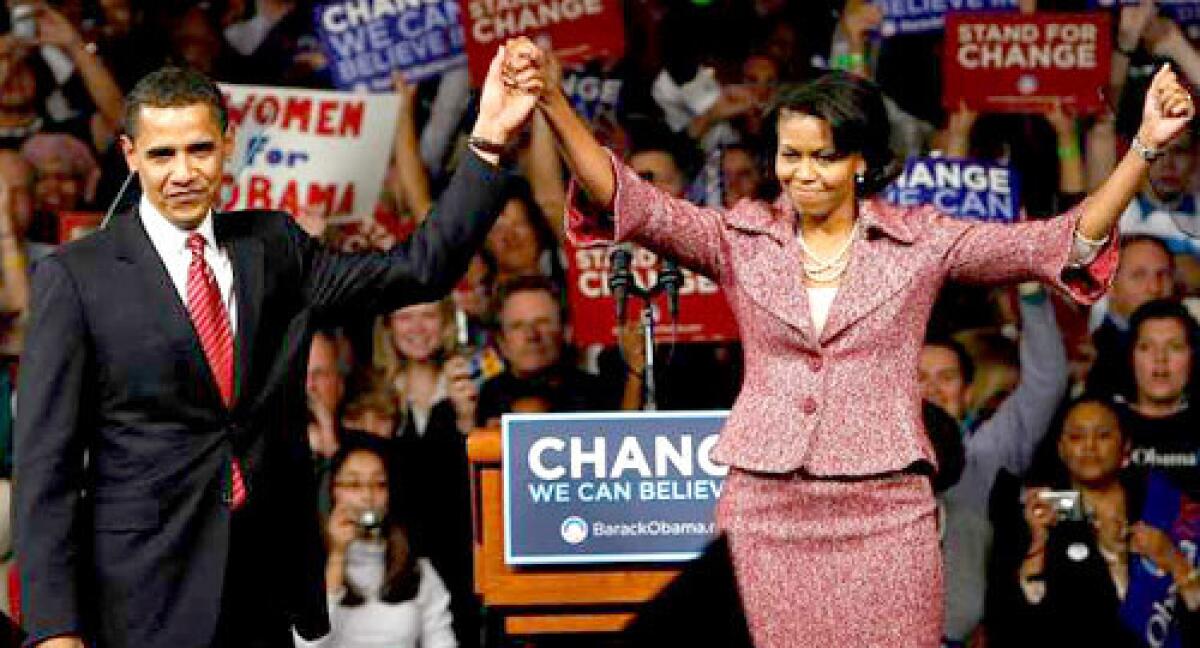From the archives: A vote for Obama, and for something larger

- Share via
ORANGEBURG, S.C. — People around this small Southern town say they know too well that it’s dangerous to guess at history before it’s happened -- to hope that times have changed.
But after voting for Barack Obama on a chilly winter Saturday, in a town with a history of racial unrest, many African Americans couldn’t help but let themselves feel that they were taking part in something larger.
They saw their votes as helping to push a black man to victory in the South Carolina presidential primary -- one that felt much bigger than Jesse Jackson’s win in the Democratic primary here 20 years ago.
On Saturday, African American schoolteachers talked about how an Obama in the White House would motivate students who complain that the deck is stacked against them. Parents hoped it would help them keep distracted sons on the straight and narrow. One woman felt it might even push those Confederate flags into the shadows.
Earthalee Brown, 85, cast her ballot around noon in the gymnasium at South Carolina State University, then allowed herself to imagine what it would be like to see Obama taking the oath of office next January in front of the Capitol dome.
“It’s going to feel like God is still on the throne,” said Brown, who grew up in segregated Orangeburg County. As she said it, Brown turned her palms skyward and laughed from deep inside.
Travis Chandler, a senior at the historically black university, was the 15th consecutive person to leave the polls around midday reporting a vote for Obama. “I never thought an African American would have a chance to win an election on this level,” Chandler said. “I think history could be made. And I want to do my part.”
The ward where Chandler and the rest voted for Obama would end up going nearly 6-to-1 for the Illinois senator over his prime challenger, Sen. Hillary Rodham Clinton of New York. Citywide, late results showed Obama capturing 68% of the 8,735 votes cast.
The chance at progress resonated deeply here, in part because of Orangeburg’s past. On Feb. 8, it will be 40 years since three black college students were killed by state troopers (27 more were wounded) as they protested segregation at a whites-only bowling alley.
It took a couple of dogged newspapermen to prove that the protesters had not, as the troopers had claimed, provoked the shooting and that many of the protesters had taken shotgun blasts in the back.
Only 15 years ago, South Carolina elected its first black congressman in nearly 100 years, Democrat James E. Clyburn. He had emerged as an African American leader during a sit-in at the segregated counter of the Orangeburg Rexall Drug Store.
That history could not be ignored Saturday at the university gymnasium, named for the three teenagers who died that day in 1968 in what has come to be known as the Orangeburg Massacre. Black-and-white photos of Henry R. Smith, Samuel Hammond Jr. and Delano B. Middleton hung directly over five blue electronic voting booths.
Willie Utsey, 60, grew up in the area and knew some of those who were shot. “It was hard. It was very hard,” said Utsey.
The semiretired truck driver and other Obama voters took pains to explain that their candidate was more than simply their color. They cited his election to the Senate, his intelligence and his reputation for being able to strike compromises with those who hold different views.
“You don’t get in because of the color of your skin. It’s the person that you are,” said George Favors, after casting his Obama ballot. “That’s what Martin Luther King said.”
Most of the Obama voters expressed no animosity for Clinton. “If she can win, that would be big too,” said Chandler.
But others said they had been distressed in recent days by comments from Clinton and her husband, former President Bill Clinton. They felt she had downplayed King’s role in advancing the Civil Rights Act of 1964 when Clinton emphasized President Lyndon B. Johnson’s role in winning passage of the law.
They didn’t appreciate her husband telling an interviewer that electing the relatively inexperienced Obama would amount to “a roll of the dice.”
Many of the Obama voters said their high hopes were tempered by the reality around them.
Orangeburg, a community of about 14,000, remains stratified. It has neighborhoods of stately homes and broad lawns not far from ramshackle trailers and open trenches that carry sewage along the streets.
A University of South Carolina political scientist not long ago concluded that blacks were three times as likely as whites to live in poverty in the state. African Americans suffer higher rates of heart disease, cancer and diabetes.
“We have a long ways to go,” said the truck driver, Utsey. “But we are getting there, slowly.”
Leaping aspirations came with another difficult corollary for a few voters. They thought of heroes like King and Robert F. Kennedy who were assassinated in their prime.
“You worry that [Obama] does well, you put him in there, and then something happens,” said Eva, a 50-year-old high-school teacher, who did not want to give her last name. She did not have to say what she was talking about.
Still, Eva agreed with another high school teacher and Obama voter: They see a role model, especially for young men who they worry are too smitten with rappers and rock stars.
“I hear from them, ‘It doesn’t matter what you do,’ ” said teacher Lakia Mustipher, 23. “But if Obama wins, it would be no more excuses. I can say to them, ‘He is making a change. . . . You can do it, too.’ ”
More to Read
Sign up for Essential California
The most important California stories and recommendations in your inbox every morning.
You may occasionally receive promotional content from the Los Angeles Times.














